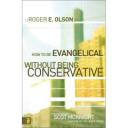Ok, I’m trying to take my blogging to the next level by consistently blogging through books. Mostly, this is for my benefit so I can have a resource to go to when certain topics come up. The first book I am starting with is Roger Olson’s, “How to be Evangelical Without Being Conservative.” If you know who Scot McKnight is I find them very similar. They are both well rounded theologians who know how to not get trapped in a certain theological grid or tradition.
Chapter 1 is titled: Being Biblical without Orthodoxy
My first thought when I hear this is that I understand the word “orthodox” as believing rightly. Shouldn’t that be something that we seek? Absolutely. The problem is that most groups don’t stop at the pursuit of “orthodoxy” but declare themselves “Orthodox” with a capital “O”. The problem that Olson concludes is that:
“Every branch of Christianity thinks it is more orthodox than others; otherwise there would be little reason for existing as a separate denomination.”p30
“The first use (orthodox) is descriptive whereas the second one (Orthodox) is prescriptive.” p30 It reaches such a state that most denominations and traditions believe that these two are actually one and they have them both.
Olson then turns to Luther and the role of questioning “orthodoxy/Orthodoxy” and the birth of the reformation. He notes that Luthers “appealed to Scripture and reason against orthodoxy itself.”p31 Yet those who seem so aggravated and upset over others asking about what the bible teaches are the ones that agree with much of Luther’s teachings. You would think for a movement born out of feeling the freedom to question things that they in fact could allow others to have that grace as well.
Unfortunately, John Calvin a leading Reformer “of Switzerland and especially Geneva, the great organizer of Protestant thought, had “heretic” Michael Servetus burned at the stake for his refusal to accept orthodox doctrines…Protestants alike hunted down and killed Anabaptists because they wouldn’t conform to belief in infant baptism and insisted on baptizing adults only. They were killed for rejecting the orthodoxy of their day…”p32
He goes on gives a few more examples having to do with Jacob Arminius and John Calvin. I guess I would say to Olson that I already concede and believe that we separate and persecute on all kinds of things that should not separate us. But where is the dividing line. What is it we can use for a litmus test to know if our teachers trust the scriptures?
A case and point for many is the emerging church. Side note: Emerging church now stands for everything and everything. You will find all kinds of great things and all kinds of terrible things. Just like you will in any denomination. However, the reason it may stand out so much is because a common thread is to ask lots of questions as to what the church really is and what role the bible plays. Honest questions are great and will bring about change so I have no problem with the emerging church. The problem is that some will use this as a cloak “Not because they are daring to question but because they are abandoning the source and norm that makes Christians Christian – God’s Word. People are free to reject that Word, but then they abdicate the right to call themselves Christians.”p35
Some more observations from Olson:
“Conservative evangelicals tend to use some tradition such as Calvinism or Arminianism as the indispensable standard of correct interpretation of the Bible. Then those traditions become equal in authority with the Bible.”p35
“If I am right, then it is the most natural thing in the world for faithful Christians to question and challenge orthodoxy in light of Scripture.”p35
“Samuel Taylor Coleridge once remarked that ‘he that begins by loving Christianity better than truth will proceed to love his own sect or church better than Christianity and end by loving himself better than all.'” pp35-36
Olson then comes up with a great idea. He says, “I suggest every organization – religious or otherwise – that is concerned with truth appoint one person to be the pai asker of truth questions. Such a person would be like the court jester of medieval kings and queens, who could mock and ridicule the royal court without fear of punishment. He or she would be rewarded rather than punished for holding the organization accountable to truth. His or her constant question would be ‘But is this true.'”
But Olson gives a word of wisdom in saying that we are fine to question tradition but perhaps we could seek to find value in it as well. “It’s good to question authority in the sense of interrogate it in the light of Scripture, but it is another thing to execute it on the basis of culture and preference for the new and unusual.”p41
…”Why not embrace tradition while critically reflecting on it from within?”
Olson concludes the chapter with a couple suggestions for those involved in the questioning process:
1. Everyone should read a good book on church history that has a plain and straightforward account of the development of Christian teachings as possible. So for example, if you are going to express doubts about the Trinity you should have a clear understanding of what is meant by that.
2. Find out what answers have already been given to your questions. For instance, what might replace the Trinity? “My experience is that Christians who really study it (Trinity) come to believe in the classical doctrine of the Trinity more firmly than before.
So maybe to be Biblical rather than Orthodox we need “to be ‘reformed and always reforming’ in light of God’s Word.”
